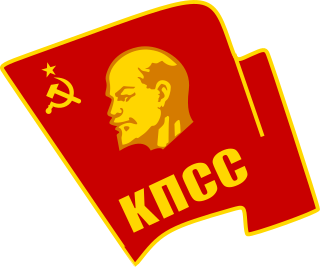
The Communist Party of the Soviet Union (CPSU), at some points known as the Russian Communist Party, All-Union Communist Party and Bolshevik Party, and sometimes referred to as the Soviet Communist Party (SCP), was the founding and ruling political party of the Soviet Union. The CPSU was the sole governing party of the Soviet Union until 1990 when the Congress of People's Deputies modified Article 6 of the 1977 Soviet Constitution, which had previously granted the CPSU a monopoly over the political system. The party's main ideology was Marxism–Leninism. The party was outlawed under Russian President Boris Yeltsin's decree on 6 November 1991, citing the 1991 Soviet coup attempt as a reason.

Perestroika was a political reform movement within the Communist Party of the Soviet Union (CPSU) during the late 1980s, widely associated with CPSU general secretary Mikhail Gorbachev and his glasnost policy reform. The literal meaning of perestroika is "restructuring", referring to the restructuring of the political economy of the Soviet Union, in an attempt to end the Era of Stagnation.

Leonid Ilyich Brezhnev was a Soviet politician who served as General Secretary of the Communist Party of the Soviet Union from 1964 until his death in 1982, and Chairman of the Presidium of the Supreme Soviet from 1960 to 1964 and again from 1977 to 1982. His 18-year term as General Secretary was second only to Joseph Stalin's in duration.

Agitprop refers to an intentional, vigorous promulgation of ideas. The term originated in the Soviet Union where it referred to popular media, such as literature, plays, pamphlets, films, and other art forms, with an explicitly political message in favor of communism.
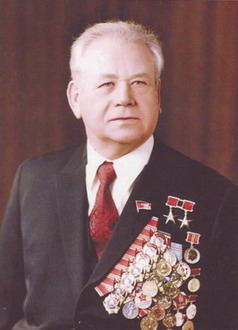
Andrei Pavlovich Kirilenko was a Soviet politician, and a member of the Secretariat of the Communist Party of the Soviet Union. He was one of the most loyal politicians to Leonid Brezhnev.
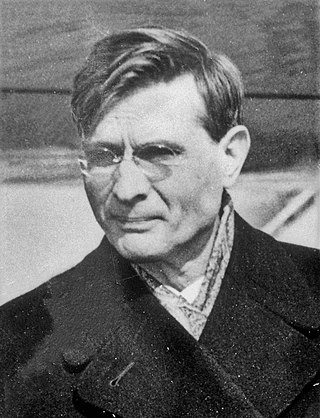
Mikhail Andreyevich Suslov was a Soviet statesman during the Cold War. He served as Second Secretary of the Communist Party of the Soviet Union from 1965, and as unofficial chief ideologue of the party until his death in 1982. Suslov was responsible for party democracy and power separation within the Communist Party. His hardline attitude resisting change made him one of the foremost orthodox communist Soviet leaders.
Marshal of the Soviet Union was the second-highest military rank of the Soviet Union. Joseph Stalin wore the uniform and insignia of Marshal after World War II.
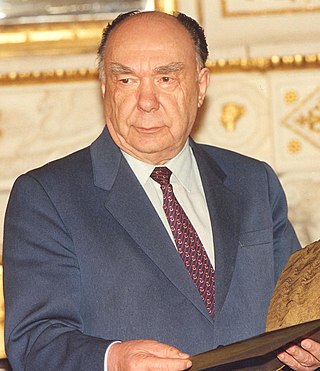
Alexander Nikolayevich Yakovlev was a Soviet and Russian politician, diplomat, and historian. A member of the Politburo and Secretariat of the Communist Party of the Soviet Union throughout the 1980s, he was termed the "godfather of glasnost", and was the intellectual force behind Mikhail Gorbachev's reform programme of glasnost and perestroika.
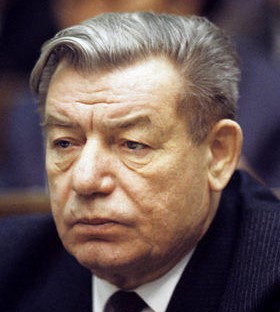
Gennady Vasilyevich Kolbin was the First Secretary of the Central Committee of the Communist Party of the Kazakh SSR from 16 December 1986 to 22 June 1989.
Martin Ebon was the pen-name of Hans Martin Schwarz, an American journalist and author of non-fiction books and articles from the paranormal to politics, particularly as an anti-communist.

Boris Nikolayevich Ponomarev was a Soviet politician, ideologist, historian and member of the Secretariat of the Communist Party of the Soviet Union. His patron in his rise to the Politburo was Mikhail Suslov.

Dmitri Trofimovich Shepilov was a Soviet economist, lawyer and politician who served as Minister of Foreign Affairs. He joined the abortive plot to oust Nikita Khrushchev from power in 1957, and was denounced and removed from power. Rehabilitated after Khrushchev's downfall, he lived a largely obscure retirement.
Georgy Fedorovich Aleksandrov was a Marxist philosopher and a Soviet politician.

The 27th Congress of the Communist Party of the Soviet Union was held from 25 February to 6 March 1986 in Moscow. This was the first congress presided over by Mikhail Gorbachev as General Secretary of the Central Committee of the CPSU. In accordance with the pattern set 20 years earlier by Leonid Brezhnev, the congress occurred five years after the previous CPSU Congress. Much had changed in those five years. Key figures of Soviet politics, Mikhail Suslov, Leonid Brezhnev, Yuri Andropov, Dmitriy Ustinov, and Konstantin Chernenko had died, and Mikhail Gorbachev had become General Secretary of the Party. For this reason the congress was widely anticipated, both at home and abroad, as an indicator of Gorbachev's new policies and directions. The congress was attended by 4993 delegates. It elected the Central Committee of the 27th term.

Nikolai Semyonovich Patolichev was a Soviet statesman who served as Minister of Foreign Trade of the USSR from 1958 to 1985. Prior to that, he was the First Secretary of the Central Committee of the Communist Party of Byelorussia from 1950 to 1956.

The Presidium of the 22nd Congress of the Communist Party of the Soviet Union (CPSU) was in session from 1961 to 1966. CPSU First Secretary Nikita Khrushchev chaired the Presidium from 1961 to 1964; Leonid Brezhnev succeeded him that year and chaired it until 1966. In contrast to full members, candidate members of the Presidium could not vote during Presidium sessions. It was normal that a full member of the Presidium had previously served as a candidate member, but this was not always the case. During the term 23 people held seats in the Presidium: 14 full members and 9 candidate members. One candidate member was promoted to full membership in the Presidium during the term. Not a single Presidium member died during this period while retaining office.

Georgy Maximilianovich Malenkov was a Soviet politician who briefly succeeded Joseph Stalin as leader of the Soviet Union after his death in March 1953. After one week, Malenkov was forced to give up control of the party apparatus, but continued to serve as Premier of the Soviet Union. He then entered a power struggle with the party's First Secretary Nikita Khrushchev which culminated in Malenkov's removal from the premiership in 1955 as well as the Presidium in 1957.
The Nineteenth Congress of the Communist Party of the Soviet Union was held from 5 to 14 October 1952. It was the first party congress after World War II and the last under Joseph Stalin's leadership. It was attended by many dignitaries from foreign Communist parties, including Liu Shaoqi from China. At this Congress, Stalin gave the last public speech of his life. The 19th Central Committee was elected at the congress.

Konstantin Fedorovich Katushev was a Soviet party official and statesman, Secretary of the Central Committee of the Communist Party of the Soviet Union (1968–77), Deputy Chairman of the Council of Ministers of the Soviet Union (1977–82), Chairman of the State Committee of the Soviet Union for Foreign Economic Relations (1985–88), Minister of Foreign Economic Relations of the Soviet Union (1988–91).
Dmitry Ivanovich Chesnokov was a Soviet professor of philosophy, journalist and politician.















